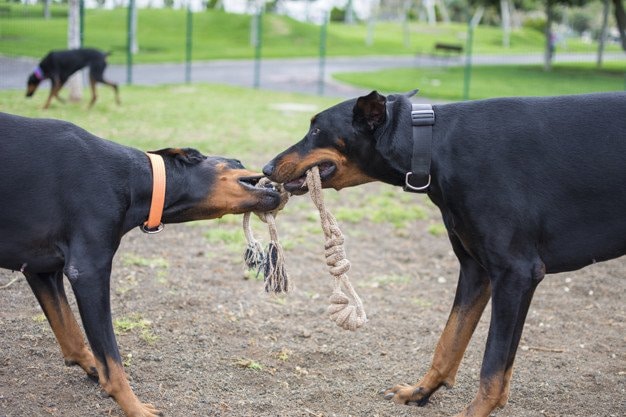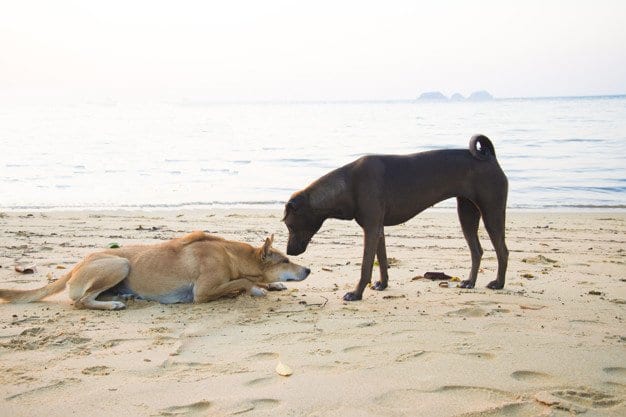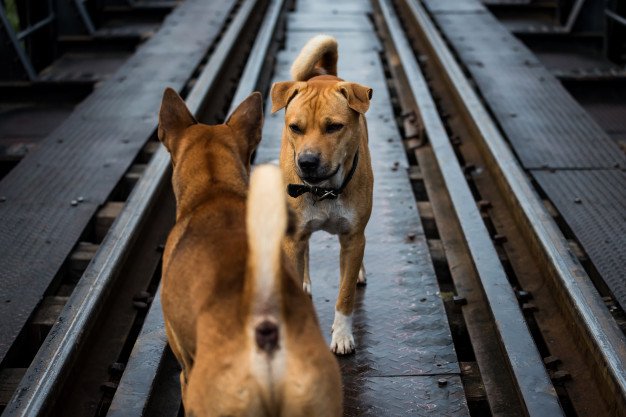One of the most baffling things that you encounter when dealing with dogs is that they keep getting into fights. This trait is seen to be common across breeds, classes, and types of training.
While there are differences with each dog, when your dog gets into a fight with its other four-legged friends, you never quite understand why this is happening.
If that weren’t enough, another major problem is that despite understanding well enough that the so-called heroic battles will more often than not result in multiple trips to the vet, that does not seem to cross your dogs mind at all.
You must have seen your dog getting aggressive towards certain dogs when out for walks.
It may gel well with some other street pups, but right then, a neighbor’s Labrador comes around, and suddenly, your dog has lost its temper completely.
Worse is when you don’t know about these aggressive incidents and one fine day you spot bruises or wounds on your little dog, it is entirely up to you to decipher what must have happened.
Understanding the Reasons

Being the best dogs are very prone to fighting in the house, and surprisingly enough, the fact that two dogs live in the same house does not seem to prevent them from going at each other.
While some fights do not last very long, if both the dogs are aggressive enough, the fight might not reach a form of resolve until one gets injured and backs down.
Dogs tend to need to maintain hierarchy in their surroundings. Every dog is very concerned with having the ‘top dog’ status in their house.
This is why you usually have two dogs of the same sex in the house, and they tend to cause havoc more often than when there are dogs of opposite genders in the house.
When there are two males in the house, each dog needs to establish that he is the alpha dog around here, and many times, the only way to prove that is by playing rough with the other dog.
When the two dogs at home are of similar sex, they are constantly trying to overpower the other one until one of the two eventually backs down and admits to it that he or she is not the alpha dog.
When you have two opposing genders, this is not the case because they maintain their respective hierarchies.
Dogs like to be the owners of their own space, and living under one roof means that space is one, and the competing dogs for it are two.
Surprisingly, this is also very common when the dogs are siblings.
Dogs related to each other do not fight in the early stages, but as the kids become adolescents, it is seen that fights tend to increase, and the need to establish dominance sets in.

1. In the mood for food
Much like us all, dogs tend to want what they cannot have, and in their case, it simply boils down to food and toys.
When you have more than one dog at home, it is suggested that you feed them in separate places and maybe even consider separate time slots.
What happens otherwise is that the dog who finishes their food first tries to take some from the other dog’s bowl, and this may result in fights.
It might even be the case that the dog is protective of its food and does not eat it if another dog is around and only tries to protect it.
Dogs get into such disputes all the time, so you should preferably either feed them in different corners of the room or different rooms altogether.
Doing this does not invoke any greed and keeps them well within limits.

2. Don’t you chew on my toy?
Another common problem is that dogs often try to take the other dogs’ toys. Dogs tend to be extremely possessive of their chew toys and the ones they have; they keep guarded.
Even when trying to get your dog to give you back a bone or a chew toy, do not use your hand because this can cause an accident.
Instead, try throwing another toy in a certain direction or saying something that excites the dog-like “Let’s go for a walk,” The dog will then immediately release the toy.
Avoid keeping any bones or chewing toys at home if your dog tends to be over possessive of them.
Multiple dogs sharing toys is always a bad idea because it will invariably result in unwanted fights and squabbles.
When dealing with multiple dogs, keep the chew toys under lock and key and only take them out when needed or consider not having any toys.

3. Environment matters
Some environments tend to be worse than other environments for your dog.
When your dog is at places like quaint open fields, it does not tend to get aggressive at all.
When out for walks, if the dog has already mingled well with the surroundings, it will usually be jolly for the entirety of the walk.
Dog parks, on the other hand, tend to be different. In a dog park, there are many more dogs, and more importantly, the dogs there aren’t necessarily known.
Your dog can easily feel hostile towards certain sizes and breeds and may display signs of aggression when approached by one.
This also happens when your dog tends to be protective of his or her owner, and in cases like these, it does not like other dogs approaching the owner one bit.
Even if your dogs are getting along well in the dog park, there is always a chance of things getting out of hand.
Dog parks tend to be areas where one individual dog has not established dominance, leading to a bunch of dogs teaming up and following the ‘pack mentality.’
When multiple dogs are involved in the same activities as wrestling around or chasing frisbees, moments of excitement can easily get out of hand and lead to unprovoked aggression.
To avoid these things, you can either find alternatives for going to a dog park or even go at a time when there are not a lot of dogs around.
4. Family feuds
When going for family holidays, it is usually the case that you will be going to one of your relative’s houses, which has a dog, and it may not necessarily mean that your dog will get along very well.
Family vacations are one of the major reasons for dog fights. What happens is that the dog who already resides at the house immediately becomes hostile.
This can even happen if that dog is generally docile. Once another dog is at the place, all the things that the dogs would become subject to being taken away.
It is also very common for the new dog to come and try to establish dominance immediately.
This is why all the things that the dog considers his or hers should be taken away and kept safe before the new dog arrives.
The dogs may need time to acquaint themselves with each other, which is completely normal. Two Doberman dogs fighting and playing with a piece of rope in the animal park.

5. Get them neutered
While this is not something every dog parent would typically desire, it is still worth a thought.
Having your dog spayed or neutered keeps the dog calmer, especially during certain times, and it is seen that dogs who are spayed or neutered are less likely to get into fights.
How To Stop A Dog Fight?
Remember that no matter what goes on through your head during a dog fight, do not use your body to stop a dog fight under any circumstances.
Understandably, your immediate reaction is to do so, but doing this can result in dog bites and unnecessary trips to the doctor for you.
The dogs may bite you in the heat of the moment, and while this is not usual, it is also understandable because of the tension. Dogs tend to get very aggressive when in a fight.
Their bites can even result in permanent tissue damage or even the need for plastic surgery.
When trying to stop a fight, it is advised that use either a broomstick or a chair as this helps you stay at a certain distance from the fight.
You can even spray your dogs with a garden hose as this will immediately distract them, and it will be easier for you to resolve the fight.
You can even use loud noises like shutting a door or banging the table, but be careful not to take out the dog’s name at a high volume, as this can further excite the dog.
